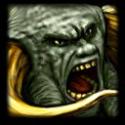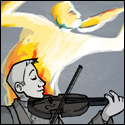|
Gort posted:The "GM is just a player" games also take some of the narrative burden from the GM. Instead of having to come up with a reason why Blackleaf the rogue is in the town of Holtburg to witness the murder of Lord Fauntleroy, you can just look at the player and say, "Why is Blackleaf in Holtburg and why does she recognise Lord Fauntleroy?" 'Eventually' my arse. Several people in this thread, myself included, have already said that because 5e is more difficult to DM than 4e, we aren't going to play because no-one in the group is willing to try DMing.
|
|
|
|

|
| # ? May 14, 2024 05:45 |
|
That's certainly true for some people, possibly myself included (I'm certainly not looking forward to trying to DM it), but the idea that a system will die if it's a pain to GM is bunk. Various iterations of 3E D&D have almost definitely been the most popular RPG in the world for over a decade, and that game's a pain in the rear end to DM.
|
|
|
|
On the other hand, I've seen it said quite a lot that some people found 4e harder to DM. The monster and encounter design/math was so much tighter and better that it made just throwing something together at random seem pretty awful by comparison, whereas in 3.X there was much less of a gap between something your DM made up and something out of the monster manual. Ditto for most homebrew by comparison with the published materials, e.g. Trollman's class.
|
|
|
|
I've listened in on a few long-running games that get played at the local store, and I've come to the conclusion that the key to GMing a long-running campaign of a pain in the rear end system like 3.X or RIFTS without burning out is to just GM very very badly.
|
|
|
|
Jack the Lad posted:On the other hand, I've seen it said quite a lot that some people found 4e harder to DM. I found 4e way easier to DM than 3e. Let's say my party is level 1 and I want them to fight some Goblins. I don't just want "Goblin with Spear" in the encounter, I want some ranged goblins, some melee ones and maybe a shaman-type leader who lobs some spells from the back. 4e does all that for me. If I want to do that in 3e, I have to make two out of three of those monster types myself using the PC rules. And the encounter design is really simple in 4e - one normal monster per player. My party is four level 1 dudes, they encounter four level 1 monsters.
|
|
|
|
Gort posted:I found 4e way easier to DM than 3e. Let's say my party is level 1 and I want them to fight some Goblins. I don't just want "Goblin with Spear" in the encounter, I want some ranged goblins, some melee ones and maybe a shaman-type leader who lobs some spells from the back. 4e does all that for me. If I want to do that in 3e, I have to make two out of three of those monster types myself using the PC rules. Yeah, I know, and I find 4e way easier as well. My point is that bad monster and encounter design in published materials enables a certain kind of DM to engage in what they see as low-effort DMing when they homebrew. These people will enjoy 5e's bad design as a feature rather than being put off by it as a bug.
|
|
|
|
In 4e it's easier to homebrew monsters because 4e monsters honestly have relatively simplistic math and few connected moving parts. This doesn't apply if your imagination has been damaged and you can't homebrew with pure creativity and instead need a full class an attribute system to slog through, of course.
|
|
|
|
Zombies' Downfall posted:That's certainly true for some people, possibly myself included (I'm certainly not looking forward to trying to DM it), but the idea that a system will die if it's a pain to GM is bunk. Various iterations of 3E D&D have almost definitely been the most popular RPG in the world for over a decade, and that game's a pain in the rear end to DM. Jack the Lad posted:On the other hand, I've seen it said quite a lot that some people found 4e harder to DM. A Catastrophe fucked around with this message at 11:01 on Aug 11, 2014 |
|
|
|
Zombies' Downfall posted:That's certainly true for some people, possibly myself included (I'm certainly not looking forward to trying to DM it), but the idea that a system will die if it's a pain to GM is bunk. Various iterations of 3E D&D have almost definitely been the most popular RPG in the world for over a decade, and that game's a pain in the rear end to DM. You have to compare it with its contemporaries, though. 3E D&D was certainly easier to DM than something like Shadowrun.
|
|
|
seebs posted:This strikes me as more a question of preference than unambiguously "progress". I mean, first time I saw a thing that had some of the roots of that was probably Ars Magica around 1988ish or so, with troupe play. (Wikipedia says 2nd edition was 1989, so I must have started sometime before the end of 1989, since I started with 1st edition.) I disagree. Railroading and a good proportion of bad RP stories are derivable entirely from the idea that the GM has greater power and authority than the other players as a matter of course. If we consider railroading or John Wick's nonsense about "immunity to the cure" to be bad gameplay (and nobody considers railroading to be good), developing a new way of writing games to better avoid railroading is progress.
|
|
|
|
|
I obviously have no way to verify this, but it seems that lovely power-tripping nerds are drawn to GM games where they can subject people to their lovely power trips. Manny of Mearls' tweets and some of the Real D&D Is Back! point toward fiat and DM >> PCs being the natural state, where the Power is finally back in his capable DM hands - unlike the socialist tyranny of 4e, where even a lowly fighter could dictate who the monsters attack.
|
|
|
|
Mendrian posted:I think it's worthwhile to mention that 'fail forward' isn't necessarily a new thing. Guys were doing that back in the 90's when I started playing DnD and I'm sure there were people doing it earlier too. What I'm trying to figure out is how "fail nowhere" or "stall backward" style play ever got popularized in the first place. The initial style of dungeon crawling was set up so that pretty much anything you did was a resource drain (time passes, wandering monster checks get made), so 'you take 30 minutes to pick the lock instead of 10 minutes' actually was a meaningful distinction. Then those resource-management minigames got taken out and people wanted to stick with what they were familiar with, despite those mechanics suddenly being horrible and boring. Kai Tave posted:Nah, it's pretty unambiguously progress for RPGs to emphasize that the GM is, in fact, one single person out of a group I think he was saying that solo-GM style isn't in some way rendered obsolete by more modern styles of GMing, not that the discovery of alternate styles wasn't a good thing. "Progress" is, I think, being used in a way that implies obsolescence.
|
|
|
|
moths posted:poo poo I did not want to import drama, I was just curious. I am late as gently caress to this party, but that's fine, man! Future posts about this should probably go to the chat thread though, that is what it's there for.
|
|
|
|
Quick question: I heard there was a feat in one of the playtest packets that allowed you to effectively cast your spells through a bow. Did that feat make it into the PHB intact and what does it actually do? I'm mildly curious as to whether a high elf wizard with said feat would actually be a better arcane archer than an Eldritch Knight geared towards archery.
|
|
|
|
Ratpick posted:Quick question: I heard there was a feat in one of the playtest packets that allowed you to effectively cast your spells through a bow. Did that feat make it into the PHB intact and what does it actually do? I'm mildly curious as to whether a high elf wizard with said feat would actually be a better arcane archer than an Eldritch Knight geared towards archery. Arcane Archer no longer exists.
|
|
|
|
Jack the Lad posted:Arcane Archer no longer exists. Alright, that seems like a good thing. Of course there's nothing preventing said feat reappearing in a splatbook in some form along the line, but this shows at least some awareness towards the fact that a spellcaster could do double duty as ranged combat guy and spell-casting problem-solver guy with just a feat.
|
|
|
|
im unreasonably annoyed by the fact that i have to wait another week for my phb when the douchebag at work already has his because he comes in late in order to go to the game store first thing in the morning
|
|
|
|
Kai Tave posted:Nah, it's pretty unambiguously progress for RPGs to emphasize that the GM is, in fact, one single person out of a group and that RPGs, being a cooperative experience, rely on that group working together towards the mutual goal of having a good time because that is the actual factual truth and almost every story you hear about GMs taking hardline "I'm the GM and I wear the viking hat!" stances are purestrain catpiss. Okay, now I think we must be talking about two different questions. I was thinking in terms of game mechanics, with "GM is authority" meaning that one of the rules is that the GM is the one that makes rules calls, and "just a player" moves towards a significantly lower level of GM authority. But this sounds like it's more about play style, and I'd argue that it can't be "modern" since the understanding that the goal is to have fun was explicitly in the D&D books as early as 1980.
|
|
|
|
Effectronica posted:I disagree. Railroading and a good proportion of bad RP stories are derivable entirely from the idea that the GM has greater power and authority than the other players as a matter of course. If we consider railroading or John Wick's nonsense about "immunity to the cure" to be bad gameplay (and nobody considers railroading to be good), developing a new way of writing games to better avoid railroading is progress. I think "progress" would imply consistent agreement that the changes are beneficial as a whole, rather than offering some benefits and some disadvantages. And I'm not convinced of that. I mean, ridiculous-example-to-prove-point, if we have a rule that the GM has to write down what they expect to happen next, and if it happens someone has to shoot the GM, that will definitely prevent railroading, but it won't make a fun game. I tend to have more fun in games with a more traditional player-vs-GM model, but I also think railroading is bad.
|
|
|
|
treeboy posted:im unreasonably annoyed by the fact that i have to wait another week for my phb when the douchebag at work already has his because he comes in late in order to go to the game store first thing in the morning If only there were some way they could make the book directly available to peoples' electronic devices, some sort of secret trick which would've allowed everyone to pick it up instantly on the same day on the same devices they'd be using at the table for reasons of convenience. Instead there's a 100% chance I'm going to pirate it as soon as I find an upload, a thing which I don't feel bad about at all because I'll be waiting on my preordered copy of a book that's been at many peoples' FLGSes to land for another week and a half. Baku fucked around with this message at 16:24 on Aug 11, 2014 |
|
|
|
ProfessorCirno posted:In 4e it's easier to homebrew monsters because 4e monsters honestly have relatively simplistic math and few connected moving parts. This doesn't apply if your imagination has been damaged and you can't homebrew with pure creativity and instead need a full class an attribute system to slog through, of course. I never want to give up the ease of DMing 4e. That's 5e's major obstacle for winning me over. Well, that and "martial characters with options and the ability to direct the flow of the game as much as wizards."
|
|
|
|
More fun math facts about the edition: The Necromancer wizard and his skeleton squad (consisting of him spending 4 spells / day) can out damage even an action surging fighter each round, they can kill the adult blue dragon listed earlier in the thread (Whose XP is more than even a level 20 hard encounter) in just over 2 rounds and can output similar damage every round forever (while the fighters damage drops of without action surge)
|
|
|
|
Stormgale posted:More fun math facts about the edition: have they maintained the traditional "skeleton summong = evil" thing? or are they assuming that DM's will know to limit this by embracing the bone pile material component aspect of the spell?
|
|
|
|
Stormgale posted:More fun math facts about the edition: This isn't unexpected tbh. The action economy has always starkly favored summoners; their one weakness was simply that hordes of small guys are inevitably too weak to actually work well. With 5e's flatter math, suddenly those weenies aren't so weenie.
|
|
|
|
treeboy: The only thing in the book about it being evil is "Though not all necromancers are evil, the forces they work with are considered taboo in many societies" under the school heading in the wizard class page area. ProfCirno: it gets even funnier because necromancers get really good buffs for their undead summons (which unlike conjuration are not concentration spells and are in fact just instant casts that follow you around), they give an automatic + wizard level HP boost to them and give their proficiency mod to the skeletons damage (Plus the obvious advantage of easy ways to give your skeleton bro's advantage) The damage difference gets even starker if the Wizard takes 1 hour at the beginning of each day to cast some spells for them then rest, use arcane recover to gain those slots back and does it again to get more, until the fighter gets a good magic sword the skeletons with basic bows (I didn't bother changing out their weapons for this, if I did the damage difference could be worse) do exactly as much damage as he does with a great sword (1d6+3+proficiency (which I set at 5 for a 16th level wizard)) vs 2d6+5 for the greatsword
|
|
|
|
Summoners are the worst thing to have in a party and people who play them in tabletop games, especially large group games, are royal assholes.Stormgale posted:The damage difference gets even starker if the Wizard takes 1 hour at the beginning of each day to cast some spells for them then rest, use arcane recover to gain those slots back and does it again to get more, I know "DM will fix it" is a lousy excuse for bad rules, but I've never understood why people let players get away with stuff like this in D&D games anyway. Baku fucked around with this message at 16:42 on Aug 11, 2014 |
|
|
|
Zombies' Downfall posted:Summoners are the worst thing to have in a party and people who play them in tabletop games, especially large group games, are royal assholes. Gere's the problem, spending an hour each morning doing that while your party does other minor stuff isn't a great inconvenience to the group, and isn't even necessary for the build, if you split out the spell slots (using say a 5th slot to gain 8 more skeleton bros then a 6th for 10 more) then just recovery as part of a normal daily routine you still inconvenience yourself less while putting out this damage
|
|
|
|
Zombies' Downfall posted:Summoners are the worst thing to have in a party and people who play them in tabletop games, especially large group games, are royal assholes. How about we stop blaming the user? If the rules are bad, then the designers are the real assholes.
|
|
|
|
By the time you encounter a CR16 Adult Blue Dragon (which, by the way, is exp budgeted at 15,000 while a level 16 party's Hard encounter budget is 9,600 and a level 20 party's Hard encounter budget is 13,200) you can easily be hanging out with 44 skeletons, which is as many as you need to kill it in one round on average. Another cool fact: by contrast, if you are a Ranger, ordering your (1) Animal Companion to attack consumes your action.
|
|
|
|
How many HP do these skeletons have? Are they fireball/dragon breath fodder, then the necromancer has to scavenge forever for more bones?
|
|
|
|
Wouldn't killing them just yield tomorrow's components?
|
|
|
|
moths posted:Wouldn't killing them just yield tomorrow's components? As DM, barring explicit contradiction by the rules, i would say bones are useless once used. Crumble to dust. That kinda thing.
|
|
|
|
Tell me there are actual rules for that and it doesn't require DM discretion.
|
|
|
|
13hp average + Wizard level if he is a necromancer and yes there is nothing saying you cant just remake them (though its more efficient to keep them alive, you can re-command 4 undead per cast (+2 per level of spell above 3) instead of raising 1 corpse pile)
|
|
|
|
So how likely would that dragon's breath weapon be to wipe out half of those skeletons on its first action?
|
|
|
|
Nancy_Noxious posted:How about we stop blaming the user? If the rules are bad, then the designers are the real assholes. I mean yeah the designers are obviously assholes because it's an edition of D&D but any player who knows something badly messes up a game or slows it to a crawl, either because they've played it before or been in a group with someone who has, and plays it anyway, is also an rear end in a top hat
|
|
|
|
Jack the Lad posted:(which, by the way, is exp budgeted at 15,000 while a level 16 party's Hard encounter budget is 9,600 and a level 20 party's Hard encounter budget is 13,200) This was already mentioned once, I guess, but this is super weird to me. Why are there two different encounter-building guides built into the game? And why do they give drastically different advice? I have the feeling that once people actually play for a few months we'll have a pretty good conception of which (if either) to follow, so I don't see it being too horribly confusing in the long term, but it is a bit baffling from a designer standpoint. By the way, though, dragons are kind of a terrible baseline to use for thought exercises like this. Their traditional gimmick is having huge level-inappropriate AoE damage that you just need to burst down quickly, making them (kind of, they aren't that fragile) glass cannon types. Same with ogres, actually (huge level-inappropriate single target PC-killing damage). They're both iconic (at least partially) because they've both traditionally been formula-breakers.
|
|
|
|
The breath weapon is a 90ft x 5ft line, so it's actually surprisingly bad at hitting lots of skeletons at once if they're arranged in (for instance) a semicircle. If you're level 20 you can raise 98 + 2 for your free Signature Spell Cast = 100 Skeletons, then rest for 8 hours and head off to fight the dragon. Split them into two groups of 50 and at least one will get their attacks off; that's more than enough to kill it.
|
|
|
|
ProfessorProf posted:So how likely would that dragon's breath weapon be to wipe out half of those skeletons on its first action? Because it's a line you can easily spread them out and or give them resistance to lightning, it's average damage should take them out even with resistance though. Still just beating it in a surprise round takes it out. As for the dragon being a bad idea, It was a high AC monster the DPR of the skeletons and the fighter doesn't really change against other stuff
|
|
|
|

|
| # ? May 14, 2024 05:45 |
|
Well Jeff Grubb approves of 5th ed.
|
|
|























